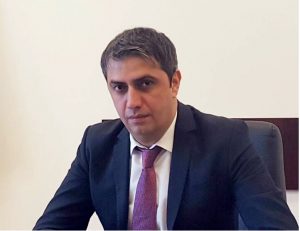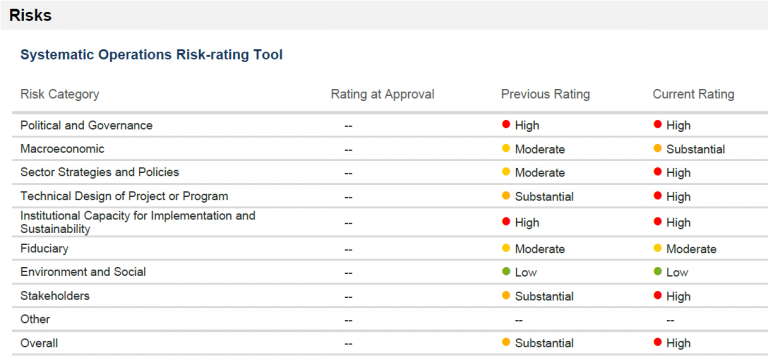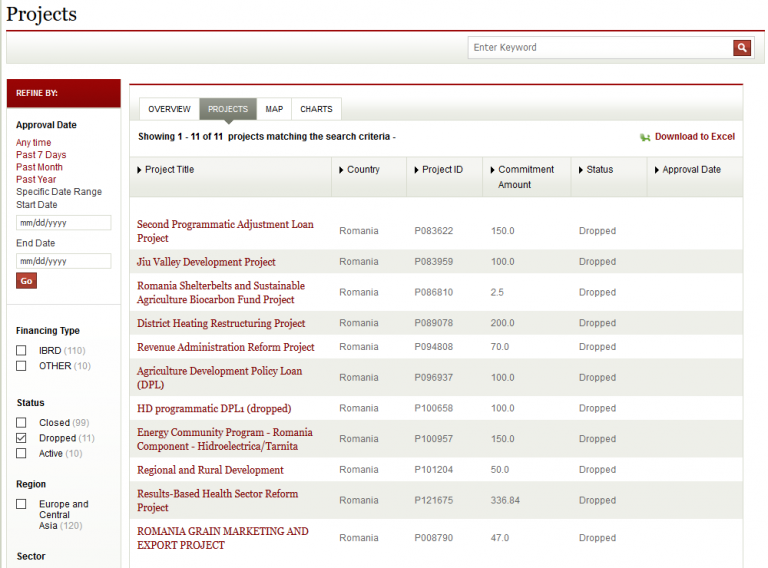 ANAF President Bogdan Stan (photo) launched on Tuesday, through Agerpres, a series of warnings on the uncertain situation of the modernization program of the Romanian tax authority carried out with the support of the World Bank.
ANAF President Bogdan Stan (photo) launched on Tuesday, through Agerpres, a series of warnings on the uncertain situation of the modernization program of the Romanian tax authority carried out with the support of the World Bank.
But he can present his own version of the truth only because the public has generally not learned the conclusions of the latest review of the project, which the World Bank has communicated to the Government on June 16.
And the WB’s conclusions on how the loan of 90 million has been spent on the ANAF reform are tougher and more discouraging than ever.
***
ANAF’s restructuring program practically failed, and all the ANAF chiefs involved in the project, including Bogdan Stan, who serenely explains that the project „exists only on paper” and finds no blame for that in what concerns him.
The list of those responsible for this failure must be started though with Gelu Stefan Diaconu, under whose mandate the project started, and who insisted first of all, in a suspect manner, for starting the works at the new headquarters, but especially for the new data centre for which he was ready to pay EUR 3,462.83 + VAT per the square meter of a 4,028-square meter building.
Dragos Doros should not be forgotten, the one who, unlike his predecessor and his successor, tried at least to unlock the project, but succeeded too little. And this is accounted for as a failure because the reform of the tax authority is not an Olympic game, where the participation is important, not the result. What Doros can be accused of is that he did not publicly speak about the problems he faces.
Noteworthy: The project with the World Bank has a loan attached of USD 91 million, of which Romania has spent so far, in vain, EUR 16.7 million, money that, if the contract is terminated, Romania will have to pay back. Probably from the budget.
(Below, with the blue headlines, the step-by-step history of this failure, from its start, to the explanations given by the actual head of ANAF- a true „series” that cursdeguvernare.ro has closely monitored).
World Bank verdict
The World Bank experts have submitted to the Government the conclusions of the latest analysis on the implementation status of the ANAF reform. In the chart below, the eloquent summary:
 The verdict, complete, with the mention, that the highlights belong to the editorial team:
The verdict, complete, with the mention, that the highlights belong to the editorial team:
„The project expenditure remains low and is delayed even against the revised program, agreed in August 2016, which shows a weaker implementation than expected (editor’s note: in August 2016, against the background of accumulated delays, the World Bank has approved a two-year extension of the initial program)
The National Agency for Fiscal Administration (ANAF) has continued the restructuring program, which includes the reorganization of the Directorate of Large Taxpayers and the establishment of the Department of Medium Taxpayers at the regional level.
However, the consolidation of local directorates has not taken place and the ANAF management has informed the World Bank that this process will not take place before implementing the revenue management system.
The tendering process for acquiring the management system is delayed. There are over 50 ANAF members involved in the evaluation procedure. The assessment criteria are far too complex and detailed.
These criteria seem to be designed to protect the ANAF employees involved in the procurement process from possible audits of the Court of Audits rather than focus on the acquisition of a highly efficient revenue management system.
A „quick reaction” team has been established (in 2016) under the authority of the project manager. The project has been approved by the ANAF management and achieved some good results.
A special attention paid to the consulting process regarding the integrity of the project implemented is very important, as is the strengthening of the management of the functions adjacent to the system, which are critical for the successful implementation of the new Revenue Management System.
These two issues have been constantly communicated during the World Bank missions. The Bank’s team will continue to support ANAF’s management in applying these recommendations.
The Bank’s team also asked for a close involvement of the Ministry of Finance and the prime minister’s cabinet to provide a strong political support to the implementation of this project.”
 To be noted: The project of ANAF’s reform has been signed with the World Bank in 2013. cursdeguvernare.ro has constantly watched the World Bank’s revisions, which have become increasingly critical over time towards the way Romanian authorities are implementing this project.
To be noted: The project of ANAF’s reform has been signed with the World Bank in 2013. cursdeguvernare.ro has constantly watched the World Bank’s revisions, which have become increasingly critical over time towards the way Romanian authorities are implementing this project.
What head of ANAF reports
„From 2015 until now, nothing concrete has happened. The modernization project exists only on paper. There are major deviations from the original timetable that set for the RAMP to be completed in 2018, deviations caused by the difficult assessment process of the technical bids received from the six bidders, the new implementation deadline being January 1, 2021,” said Bogdan Stan, quoted by Agerpres.
The head of the tax authority believes that it is necessary to rethink the options available to ANAF, given that this delay may be even bigger in the coming years.
The ANAF’s current infrastructure of servers and data centres storage units has an equipment at the end of its life-cycle with „an advanced wear and tear and obsolesce” at a 99% load level, recalls the head of ANAF.
The main cause of this situation: „Framework agreements and subsequent contracts concluded since 2013. Without a recovery of the IT system, RAMP will not be applied. The IT system must be maintained functional. But it has not been purchased an IT equipment to maintain the current infrastructure of servers and storage units at reasonable rates,” the ANAF president said.
The head of ANAF proposes to replace the maintenance contracts with a contract for ensuring the functioning of ANAF’s IT system infrastructure and replace the hardware platforms with new ones.
Last week, the head of the tax authority said in a press conference that an analysis is currently underway on ANAF’s restructuring, which will be presented to the prime minister.
Prime Minister Mihai Tudose had no comment on the ANAF’s restructuring process, and said on Monday, regarding the activity of the institution, that figures look better than last year but not „so well” as they should, given the economic growth.
ANAF reform – „twisted” up to a Romanian version
The current head of the tax authority is conveying important messages and speaks, without offering details, about rethinking the options, based on an analysis of the ANAF’s restructuring, which will be presented to the prime minister.
What can this statement signify given that the analysis – even the analyses – are already made by both the World Bank and the project consultant and the restructuring program is already the subject of a contract?
The only possible answer: the political decision is that the restructuring/increasing the efficiency of the tax authority should be made based on a local model, not the model agreed with the World Bank.
If this is the right answer, then there are very high chances for the project to be cancelled. And that would not be a premiere – other 11 projects with the World Bank, including one regarding the reform of the revenues in the administration, have been cancelled by the post-December governments of Romania.
 List of projects abandoned by Romania
List of projects abandoned by Romania
Bogdan Stan is the President of ANAF for 6 months, that is, half of the period covered by the latest World Bank review. As president of the tax authority, Bogdan Stan’s duty was to impose the acceleration of the restructuring process, not just to lament about what his predecessors did, or did not.
Especially that he talked about the problems of the IT system right after his appointment as president, in January. It seems at least odd to know the problem, but do nothing about it.
The „restraint” in the ANAF’s restructuring process is real and has been confirmed for cursdeguvernare.ro also by persons supervising this process. People who nominate Gelu Stefan Diaconu as the main responsible person for this failure.
The same Gelu Stefan Diaconu who is very active on Facebook lately in criticizing the tax measures considered by the PSD governments and who suggests, under Nini Sapunaru’s indulgent look, that he would be willing to help the new PNL’s leadership team.










